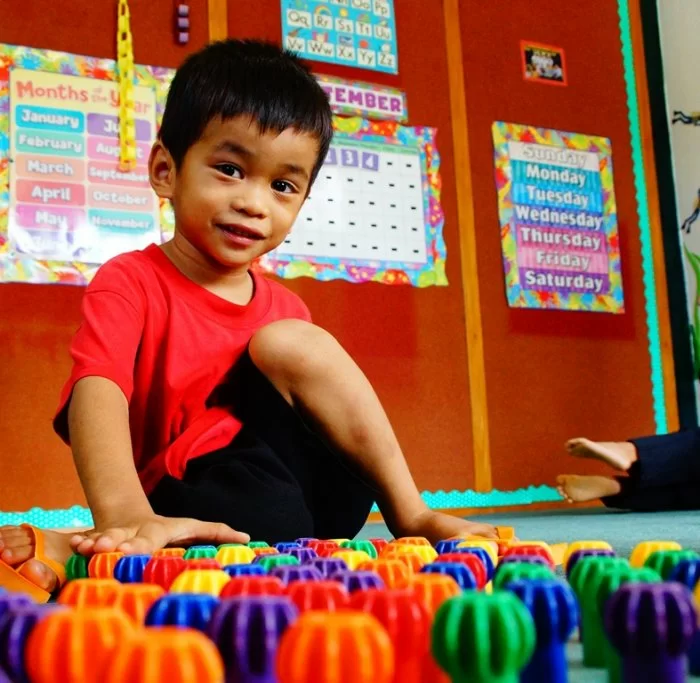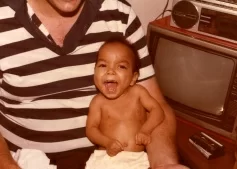 without a thought on my part. But Luke came to my mind yesterday and I looked up some information on him and discovered that his birthday had just passed. I found this old article that I wrote about Luke a few years ago. I thought I'd share it again. I am convinced that there are important and significant lessons we can learn from his life, and that I need to regularly share what I think they are. I hope you enjoy this!
without a thought on my part. But Luke came to my mind yesterday and I looked up some information on him and discovered that his birthday had just passed. I found this old article that I wrote about Luke a few years ago. I thought I'd share it again. I am convinced that there are important and significant lessons we can learn from his life, and that I need to regularly share what I think they are. I hope you enjoy this!The mysteries of God are a part of the Christian life that can often lead to confusion, doubt and even discouragement for believers.
- For some, it's a pride thing. We want to have answers – we want to understand, to be able to grasp the complexities of Biblical truth and God's plan for mankind.
- For some, God's mysteries – the unexplained things of life – are stumbling blocks to faith:
1. Why do bad things happen to good people?
2. Why does He allow pain, suffering and evil to thrive in our world?
Several months ago we were witnesses to the aftermath of the tragedy in Pennsylvania involving the Amish community, where, good, decent, hard working, non violent people were subjected to unspeakable cruelty towards their children. How can this happen?
3. One of our CSC children, who grew up in the worst poverty imaginable in Cebu City, was adopted into a family in the United States several years ago. Well meaning people would tell her how lucky she was and how God obviously had a wonderful plan for her life. She had a hard time with that and would sometimes ask her parents, "But what about all the kids who are still there, who weren't adopted, and who are still suffering and dying? What is God's wonderful plan for their lives? Why me and not them?
For many of us, we celebrate the goodness of God in our lives, we praise him for his healing, for material comforts, for blessing our efforts – even as we observe people who remain sick or disabled, who suffer in poverty – those who efforts and initiatives end in disappointment and ruin.
There are two extremes in terms of people's reactions to the things about God and life that are not understood.
1. There are those who try in vain to grasp the ungraspable – to be able to reduce the mysteries to understandable formulas or explanations. I remember a young seminarian who came to Cebu and who filled the pulpit of our church on a Sunday evening. He preached for an hour on the "peace of God that passes all understanding." Perhaps he felt that if he preached long enough he could crack that nut and open our understanding!
We all know those who have reduced the book of Revelation to precise charts and timetables, giving us easy to understand categories for all of human history and, most especially, the times to come.
2. A second category are those who shake their heads and say, "We'll only know these answers when we get to heaven." They suspend inquiry, not bothering to seek answers to the perplexing questions of life.
Living and working in a Third World country like the Philippines brings some of these mysteries to the front of our lives. Poverty, and all that goes with it, is "in your face." People often ask me "How do you like living in the Philippines?" That's a tough one to answer. Life anywhere has its highs and lows. Some days are great, others are difficult. I often answer this way:
1. When I'm sitting down to a nice breakfast I am aware that, within a few meters of my house are families that have no breakfast.
2. When I'm driving to the office or the Shelter I often pass people walking along the road who, for lack of a few cents can not even afford public transportation and must walk.
3. When I stop to buy medicine for my family or the CSC kids, there are people standing nearby whose children are dying for lack of that very same medicine.
Why am I blessed and they are not?
I recall a conversation with a missionary a few days after Cebu was hit by a strong typhoon. Many of our CSC workers lost their roofs or their entire homes. The houses of the poor were devastated by the high winds and torrential rains. The missionary said that it had been such a miracle how God spared the missionary homes from damage, holding his hands of protection around us during the storm. I remember wondering whether it wasn't more a matter of our having cement houses and strong metal roofs.
Why did our CSC kids have to suffer so much? And how much more, those who live on the street and cannot be admitted to CSC?
These are tough questions. When it comes to trying to understand our own suffering, the Bible gives some answers. For example, Romans 5:3-4 tells us that suffering produces perseverance, perseverance character, and character, hope. And the Bible gives us additional hope that we will someday come to see God's purpose and mysteries:
"But now we see through a glass dimly, but then face to face."
And we hear the testimonies of Christian brothers and sisters who have lived through terrible times and have turned negatives into positives in their lives.
Several months ago I was attending a conference in Bismark, North Dakota. One of the featured speakers was Steve Saint, Steve's father, Nate Saint, was one of the five missionaries killed in 1956 by Aucan warriors in Equador. Steve told about what that tragic day meant to his family, and what it was like when his dad, his hero, didn't come home that day. We saw video of his current family life, and saw a man who was interacting with Steve's children, and who was being referred to as "Uncle." It turns out that this was the very man who had killed Steve's father, who had come to know Jesus and had experienced the forgiveness of God and of the Saint family and now was a part of their family – an amazing story of how good things had come out of tragedy and suffering.
So the clear message is that God has a plan for our lives, we will discover that plan in the right time. He is writing our life's stories, but some of the chapters are difficult ones.
We can understand this. We can, when aided by the Holy Spirit, see how difficulties and suffering are part of a purification process for us, and that we, like Job, will eventually be better people for it.
But what about people who, because of major disabilities, are unable to understand their situation, unable to discern the hand of God or his plan for their lives. Where is the purification and growth and ultimate value for these people? What could God's purpose possibly be?
Back on 1982 a baby was born in a charity ward in a small hospital in Cebu City. 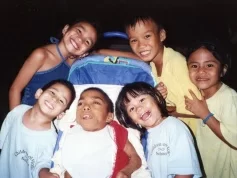 The baby underwent cardiac arrest during birth and was without oxygen for an extended time. Unlike many cases of charity patients, the hospital staff decided to resuscitate the baby, even after he had suffered massive brain damage and cerebral palsy. The baby's mother abandoned him in the hospital, and after a couple months Luke was referred to CSC. When we took him in he appeared to be a bouncing baby boy. We did not know that he would not develop physically beyond about a year and a half, or mentally beyond a few months. Luke would never speak, nor have voluntary movement of his arms or legs.
The baby underwent cardiac arrest during birth and was without oxygen for an extended time. Unlike many cases of charity patients, the hospital staff decided to resuscitate the baby, even after he had suffered massive brain damage and cerebral palsy. The baby's mother abandoned him in the hospital, and after a couple months Luke was referred to CSC. When we took him in he appeared to be a bouncing baby boy. We did not know that he would not develop physically beyond about a year and a half, or mentally beyond a few months. Luke would never speak, nor have voluntary movement of his arms or legs.
Luke became a fixture at CSC. For over 23 years he was an integral part of our lives and a symbol of CSC and what we are all about.
Many times Luke would be hospitalized – often due to upper respiratory infections. He fought for his life many times. There were at least a dozen times when we were sure that he would die. The doctors had told us that he wouldn't make it past five years old. Then they revised it to nine, then 11 – certainly he wouldn't reach his teenage years.
One time, when Luke was critically ill our staff met to pray and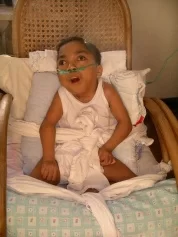 I asked them to reflect on his life. Here is why: I believe that God had a purpose for Luke's life when he created him. I believe that He uses people like Luke to teach us important things. But here is the rub: If we don't spend time reflecting on these lessons, then Luke's life is useless. Its up to us to allow God to make sense of Luke's life.
I asked them to reflect on his life. Here is why: I believe that God had a purpose for Luke's life when he created him. I believe that He uses people like Luke to teach us important things. But here is the rub: If we don't spend time reflecting on these lessons, then Luke's life is useless. Its up to us to allow God to make sense of Luke's life.
And what are the lessons that we found? What has God taught us through his life?
1. First, life is precious. Even though he had nothing to live for, from the world's point of view, Luke clung to live almost ferociously. Some of us who have much more to live for take life casually, we take life for granted. Not Luke. Every day was a struggle. Every breath had to be fought for. Life is a gift from God and we should treat it carefully.
2. God has provided us with opportunities, through Luke's life, to minister to him in significant and life-saving ways. He has provided an avenue for us to live out the biblical mandate to minister unto the "least of these," because, truly, Luke was in that category. Hundreds of people have been given a blessing to participate in the support of CSC that reaches out to children like Luke and many others with other special needs.
3. In so doing, He has given us a chance to show others a Godly value system that doesn't reserve love and attention for those who have something to give back, or who have "potential" or a bright future. For many people who live in a developing country, where resources are limited, this has been a difficult lesson to learn. How could we justify spending so much money for Luke's hospitalization when other, "normal" kids needed care? Luke's life gave us the opportunity to teach about the value of life and about how God looks at all of us.
4. Luke has been a tremendous ambassador for CSC. People around the world remember observing the loving care that he received by our staff and workers. They remember his famous smiles. They may quickly forget the names of the staff or other children, but they remember Luke. "How's Luke doing?" we get asked wherever we go to talk about the ministry of CSC. And our care of Luke helps us explain the true nature and core values of our work in the Philippines.
5. Luke has been a safety valve for those that had an opportunity to know him. My job as Field Director of CSC involves lots of administrative chores, like making budgets, government relations and various kinds of problem solving. There are days when I get stressed out and start to feel the weight of the world on my shoulders. But all I needed to do is to drive a few short miles to where Luke lived, to hold him in my arms, and I get a clear picture of what real struggles are all about. My struggles paled in comparison to what Luke faced every day. Self pity may be easy for some people, but those that knew Luke have no excuse for feeling sorry for themselves. What a great gift that was to all of us.
A little over a week before we left Cebu, Marlys called me on my cell phone and told me that I should get to the hospital quickly, as Luke wasn't doing well. He had been hospitalized for over a week and his breathing was bad. I had gotten messages similar to this one throughout Luke's life, so I went to the office and took care of a few things. But the Lord laid it on my heart to go see Luke and when I entered his room his breathing was extremely labored. He looked different than I had ever seen him, and it became clear that he was dying. I sat down next to him, kissed him and looked into his eyes. For 23 years we had loved this boy. It wasn't easy to say goodbye. I said to him, "Luke. You can go. Go to be with Jesus, Luke. I love you." Within a couple of minutes Luke took his last breath. 23 years of pain, suffering, limitations, hospitalizations, forced breathing, skin rashes and infections were over. We would never see Luke's smile again.
As Luke was dying in that hospital room, I made a promise. I'm not sure if I was making a promise to Luke, to God or to myself. But I decided then and there that I was going to talk about Luke on our coming furlough. I believed then and do now, that the church of Jesus Christ needs to hear about Luke, that the lessons of his life are important ones. Many Americans are complainers - full of self pity. People who have so many material comforts are unsatisfied. American discourse is increasingly a chorus of victim and entitlement claims. Charles Sykes, in his book "A Nation of Victims: The Decay of the American Character" states that, "in a nation where everyone is a victim, no one is a victim." In our preoccupation with our own needs we have a hard time seeing the needs of others – people like Luke.
In his song "God Help the Outcasts," the Hunchback of Notre Dame poses several difficult issues:
I don't know if there's a reason
Why some are blessed, some not
Why the few You seem to favor
They fear us, flee us,
Try not to see us.
The first part we have already examined. The second is our call to arms. "Why the few You seem to favor, they fear us, flee us, try not to see us."
I don't know what factors might make it difficult for us to see the needs of society's outcasts. Perhaps we are too busy. Maybe our personal and church calendars are so full that there just isn't room for Luke, or the man who had fallen to thieves at the side of the road, to break into our day. Maybe we are numbed or fatigued by the needs of others, or simply overwhelmed by the circumstances of our own lives. Maybe we have become cynical. "Why did that guy travel this road at this time carrying that amount of money? He deserves what he got!"
Maybe, just maybe, Luke can help cut through the apathy, the self-centeredness and cynicism of our lives. He was a person with significant needs that he didn't cause. He was totally dependent on others to live. His life had none of the possibilities and opportunities that we take for granted every day. He needed us so very much. Maybe Luke can serve as a symbol of many others that we come into contact with. Maybe Luke can help us rescue our lives.
Progress is...
prog·ress
part of speech: noun
pronunciation: ˈpräɡres/
1. Forward or onward movement toward a destination.
2. The advance or development toward a better, more complete, or more modern condition
part of speech: verb
pronunciation: prəˈɡres/
1. To move forward or onward in space or time.
2. To advance or develop toward a better, more complete, or more modern state.
It is almost summer where you are, so bare with me on this journey through Webster's pages and this highly intellectual post! ;) Progress, the noun, is a thing most of us look for to determine the success or failure of an effort. It a measure of change, advancement, improvement---pounds lost, degrees earned, etc., toward a goal. It is something we want to see.
Progress, the verb, is the effort. It is the actual forward motion. It encompasses the sweat and tears involved in bettering oneself, finishing a degree, running another mile. Or as it says above, becoming more complete. It is a process requiring hard work.
Sometimes progress, the noun, is hard to chart or to see. The work is there, but it seems there is little to show for it. Thankfully, at CSC, this is not true.
Below you will see only a smidgen of the countless proofs of progress at CSC, in a series of before and after pictures. Children arrive to CSC usually in a bad state. They are often not healthy. They stay in our Infirmary for as long as it takes to rid their bodies of lice, worms or other illnesses. The evidence of physical progression alone is cause for rejoicing in God's goodness to improve the lives of CSC's children. However, their progress is much more than physical.
If you look at many of the faces in the before pictures, their is understandable fear and uncertainty registering there. Strangers are visiting them and talking about taking them from their home. Of course it is for their betterment, their progress, their health, but that is hard to fully communicate in such emotional times. But look at the faces in the after pictures. There is peace, happiness, and excitement.
Some synonyms for progress: make headway, get better, gain ground, improve, advance, develop, and make strides. For our youngest residents, they literally learn to walk and then run while in our care. Now that's progress!
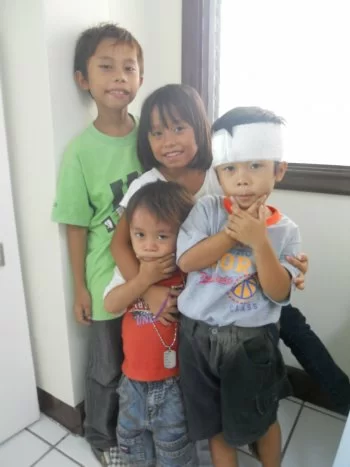
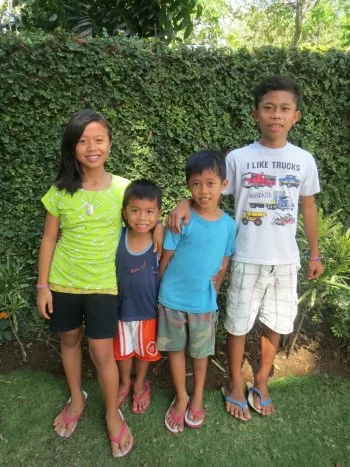
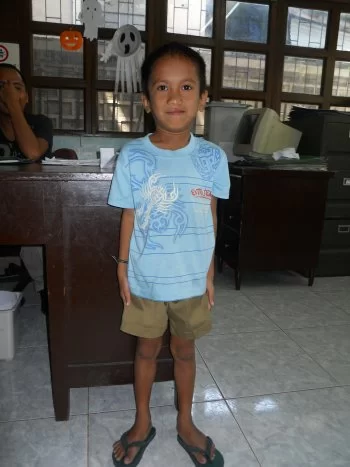
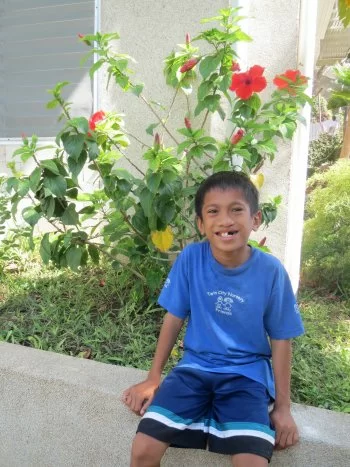
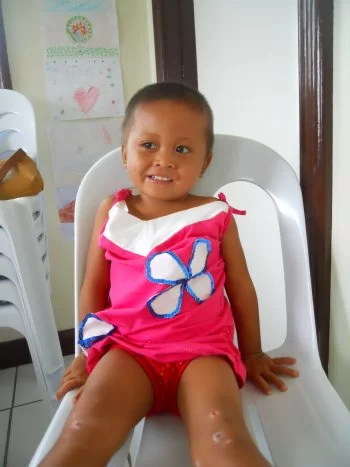
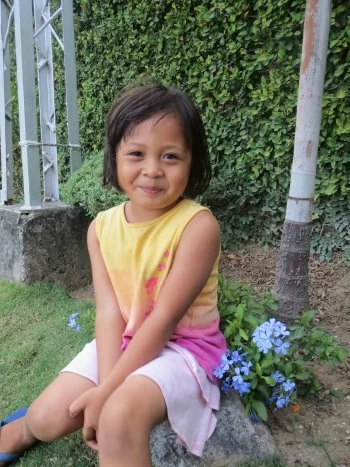
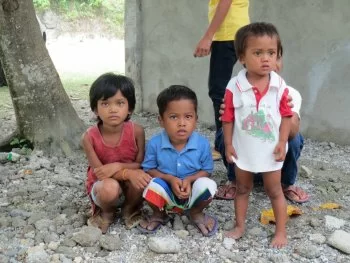
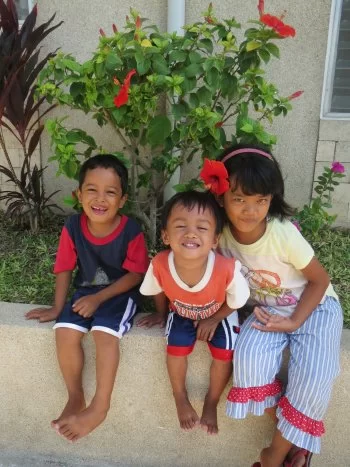
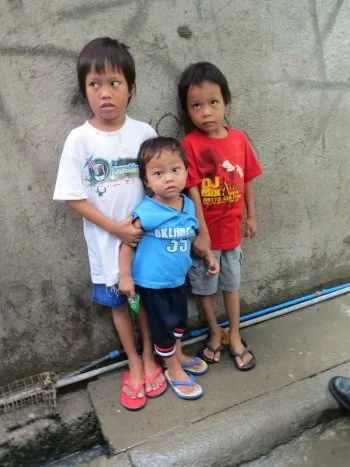
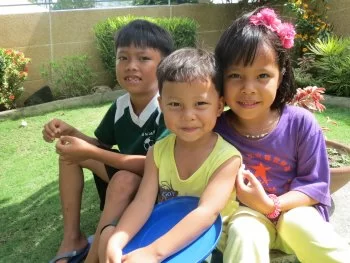
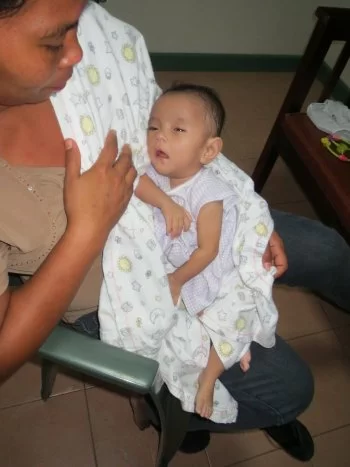
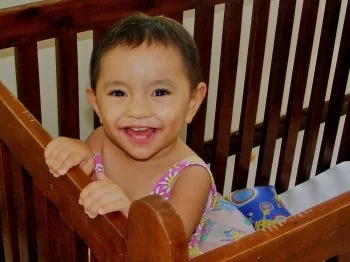
Some other synonyms for progress: thrive, prosper, blossom, and flourish.
And that is what kids do at CSC. There are many hands working tirelessly for the advancement of these precious children. From nurses, teachers, therapists, social workers, counselors, houseparents, guards, missionary staff and childcare workers. Their effort contributes to the progress of the children. I don't want to leave out the effort put forth by our children though, because that is very real too. They take the risk to trust, and follow our instruction and learn to be a kid again. And finally, the investments made by you donors is effort, it's forward motion. Your effort can also be seen in the smiling faces above.
To me, this is what progress looks like.
Visitors and Guests
After being in Cebu for a little over four months, I have
realized we welcome lots of people. Some people include the many
visitors and supporters of CSC. 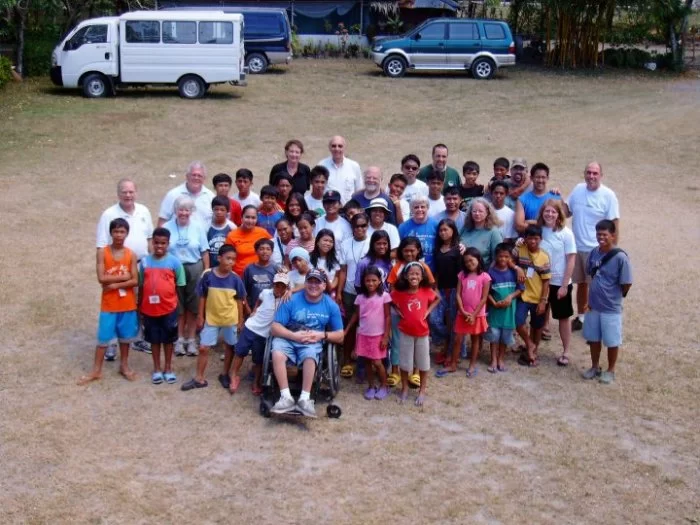 Over five years ago, I was
welcomed to CSC in a very different context. I came with the Central
Baptist Church work team. I was embraced by not only the staff members
here, but also the kids. I remember stepping out of that van for the
first time and being rushed by about 50 smiling and laughing children.
Over five years ago, I was
welcomed to CSC in a very different context. I came with the Central
Baptist Church work team. I was embraced by not only the staff members
here, but also the kids. I remember stepping out of that van for the
first time and being rushed by about 50 smiling and laughing children. 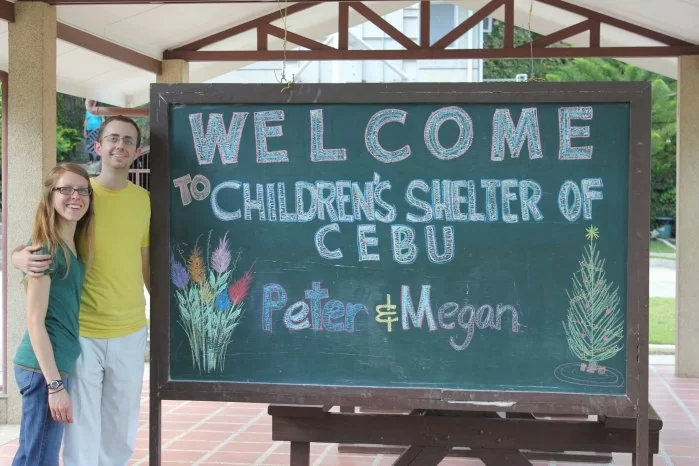 Four
months ago, Peter and I were welcomed in a much quieter setting. Joel
greeted us at the airport and we then had a quiet lunch with the staff. After packing up all of our belongings, saying our sweet and
lengthy good-byes to family and friends, and traveling for over 24 hours,
I needed a tranquil welcome. I'm thankful for the low-key greeting we
received.
Four
months ago, Peter and I were welcomed in a much quieter setting. Joel
greeted us at the airport and we then had a quiet lunch with the staff. After packing up all of our belongings, saying our sweet and
lengthy good-byes to family and friends, and traveling for over 24 hours,
I needed a tranquil welcome. I'm thankful for the low-key greeting we
received.
As I think of the many people I've met since
December who have visited CSC, I can somehow relate to a piece of their
experience. Here they are, for maybe the first time, or the first time
in many years, stepping foot onto the campus, seeing the grounds and the
people and the kids for real, and taking it all in. When I came the
first time, it was all so overwhelming and fun and awe-inspiring. It was
also emotional as I thought about and processed the lives of the kids:
where they lived, what their lives were like before CSC, how hard so
many people work to take care of them, and how they are resilient in
incredible ways. I know visitors and guests don't all experience CSC in
the same way, but I know people leave impacted by what they saw and
experienced. I imagine many leave with a lot to process and
digest. It's enlightening for me to reflect back on my time from a few
years ago and think about where I've been and how I've changed in light
of my experiences.
Soon we will welcome a young lady who
will work with us for about 10 days. It will be exciting to have her
here and hear her perspective on her time and experience at CSC. I hope she,
and other visitors, have a vivid and meaningful understanding of the
work God is doing through so many people and how he is touching so many
lives through this ministry.
Banquet-season Reflections
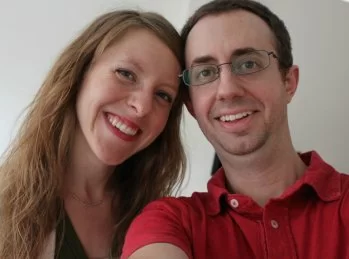 I think the CSC banquet is always going to prompt a time of
reflection for me, at least since attending in 2014. Last year wasn’t my first
time there, but it has changed everything.
I think the CSC banquet is always going to prompt a time of
reflection for me, at least since attending in 2014. Last year wasn’t my first
time there, but it has changed everything.
One year ago my wife Megan and I sat at the CSC banquet pleased to be donors and planning to ask Matt Buley out for coffee to see if there were any other ways we could help; we were picturing something like stuffing envelopes.
This year we watched the CSC banquet from the Children of Hope School library in Cebu through a live feed. We’ve been here 4 months. We did get to stuff some envelopes, but we also ended up moving to Cebu.
Looking back, I’m not really sure how it happened. I had a good job that I enjoyed and Megan was just completing grad school, we weren’t really looking to move to the other side of the world. As best as I can figure, God just had a different plan and it kept getting clearer to us that we needed to listen. We had this growing feeling that God had taken the reins and we were now along for the ride.
I know I’m in God’s hands whether I’m in St. Paul or Cebu City, but it’s felt a little different since the banquet last year. My hunch is that this is a normal feeling around CSC. This ministry has been relying on God to sustain it since Marlys Healy came in 1978. I’m just one of the latest people to get wrapped up in what God is doing here. Through CSC, God is generously providing opportunities for all of us to labor, laugh, donate, and share in the work He is doing in the world. It was hilarious to see the video of Paul and Matt looking for Jared Gustafson and a special treat to see the tribute video about Sandy’s work at CSC, then to look over and see her sitting a few feet away smiling (appreciative, but not particularly thrilled about all the fuss being made over her). I loved watching Pastor Gustafson mark off the banquet attenders on his fingers who were going to donate an extra $100 just so we could set a new donation record.
Thank you for being engaged in this work too! I wonder where
the next year will take us!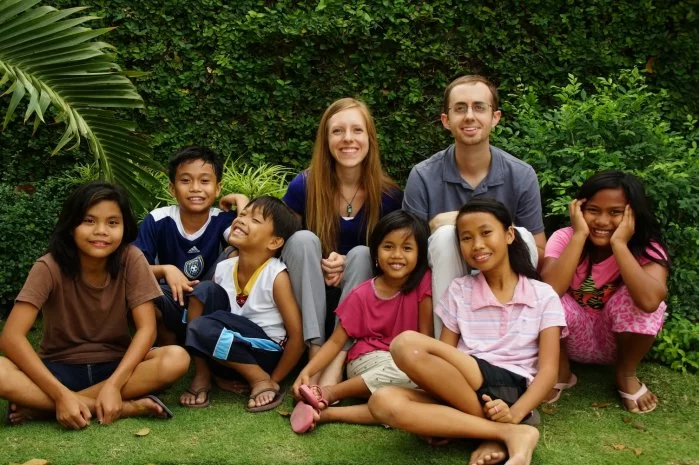
Stepping In
This year’s theme of our annual banquet was FRIENDS and this rang true for the entire event. What an amazing group of friends we have at CSC. Almost 800 of our close friends came together to pray for, celebrate and financially support the ministry. We watched videos, heard from former residents, recognized adoptive parents and rejoiced with updates and happy news.
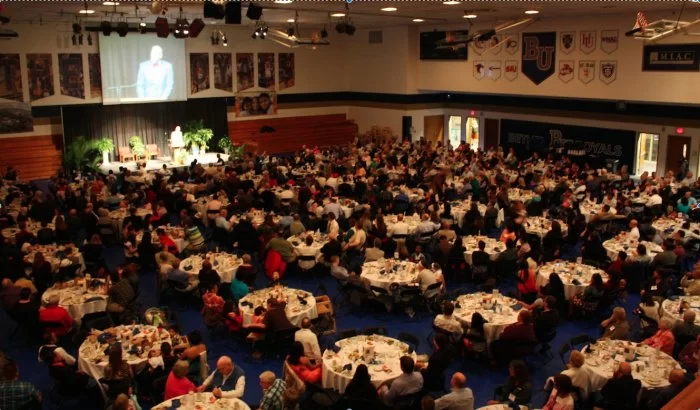
We also shared about the Foster Friend program and offered the chance to sign-up that night. We had many banquet attendees who joined the program that evening. One donor walked up to me and handed me a foster friend sign-up card. She wanted to support one of our children, Shelanie. I got the chance to share with her about this little bubble of energy named Shelanie and what a joy she is to everyone at the shelter. I asked this new donor how she was connected to CSC. She explained that just a few months ago, her dear friend died. It turns out her friend was a dedicated foster friend and long-time supporter of CSC. With tears in her eyes, she said “I realized with her gone, someone needed to step in to fill her role. So I want to do that.”
We are so thankful for everyone who steps in to help Shelanie and the other children at CSC.
Change
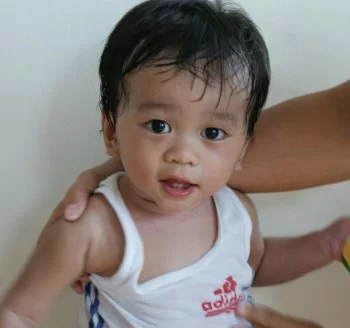
This little boy came to CSC in 2011. He was not healthy, he was scared.
I worked with him not knowing how to start. He showed a lot of concerns in so many areas.
With the everyday schedule we have for therapy, he and I formed a bond.
If you have been to CSC, you know that it is hard not to have a favorite, but this little guy captured my heart.
Last year, Joel and I went to the States for a one year furlough. It was hard to leave the kids behind, especially the ones I had been working with everyday for 6 years. When we came back to CSC, I was amazed with the many positive changes the kids showed. One especially was this little dude.
He continues to receive therapy at present and is very eager to come to his sessions. Just the other day, he kept on bugging an auntie that he needed to go and see me for therapy. It was in fact not his scheduled time, but what do you do with an eager child? Yes, we did our therapy and we had a great time cutting playdoh!
Now, every time he sees me, wherever he is – at school or at the shelter, whatever he is doing, he calls and shouts out my name, “Teacher Jinkee!!” That, for me, is the most rewarding part of my job.
